新人教版八年级上册英语重点知识点短语句型(精华版)
人教版八年级上册英语各单元重点形容词短语句型
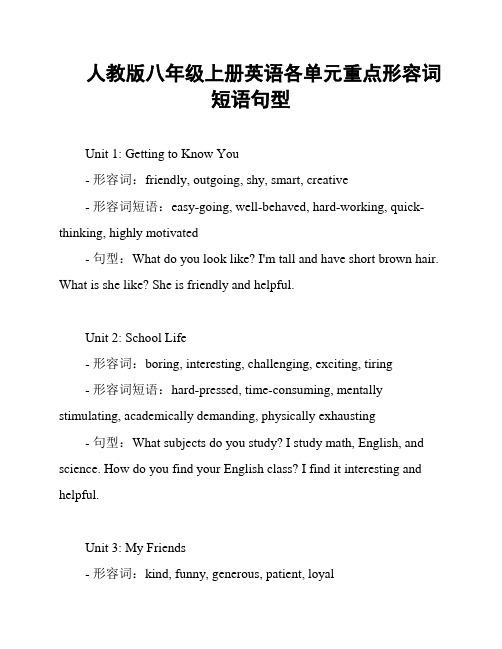
人教版八年级上册英语各单元重点形容词短语句型Unit 1: Getting to Know You- 形容词:friendly, outgoing, shy, smart, creative- 形容词短语:easy-going, well-behaved, hard-working, quick-thinking, highly motivated- 句型:What do you look like? I'm tall and have short brown hair. What is she like? She is friendly and helpful.Unit 2: School Life- 形容词:boring, interesting, challenging, exciting, tiring- 形容词短语:hard-pressed, time-consuming, mentally stimulating, academically demanding, physically exhausting - 句型:What subjects do you study? I study math, English, and science. How do you find your English class? I find it interesting and helpful.Unit 3: My Friends- 形容词:kind, funny, generous, patient, loyal- 形容词短语:always there for me, full of humor, never let me down, extremely caring, incredibly supportive- 句型:Do you have close friends? Yes, I have a few close friends. What do you like about them? I like their sense of humor and their loyalty.Unit 4: Hobbies and Interests- 形容词:exciting, relaxing, enjoyable, fascinating, addictive- 形容词短语:highly engaging, incredibly satisfying, deeply captivating, incredibly addictive, extremely challenging- 句型:What are your hobbies? My hobbies are reading and playing sports. How do you feel when you engage in these activities? I find them relaxing and enjoyable.Unit 5: Festivals and Celebrations- 形容词:colorful, festive, joyful, traditional, memorable- 形容词短语:rich in culture, culturally significant, highly anticipated, deeply rooted, widely celebrated- 句型:What festivals do you celebrate? I celebrate Chinese New Year and Christmas. How do you celebrate them? We have family gatherings, eat special food, and exchange gifts.Unit 6: Health and Fitness- 形容词:healthy, fit, energetic, active, balanced- 形容词短语:physically fit, mentally alert, emotionally stable, nutritionally balanced, holistically healthy- 句型:How do you keep fit? I exercise regularly and eat a balanced diet. How do you feel when you are healthy and fit? I feel energetic and active.Unit 7: Travel and Adventure- 形容词:adventurous, thrilling, breathtaking, cultural, picturesque- 形容词短语:filled with excitement, heart-pounding, awe-inspiring, culturally enriching, visually stunning- 句型:Do you like traveling? Yes, I love traveling and exploring new places. How do you describe your travel experiences? They are adventurous and culturally enriching.Unit 8: Environment and Pollution- 形容词:clean, polluted, green, sustainable, eco-friendly- 形容词短语:environmentally conscious, pollution-free, resource-efficient, eco-friendly practices, sustainable development - 句型:How do you protect the environment? I reduce, reuse, and recycle. What do you think about pollution? I think pollution is harmful to both humans and the environment.。
人教版新目标八年级英语上册各单元重点单词和短语梳理归纳
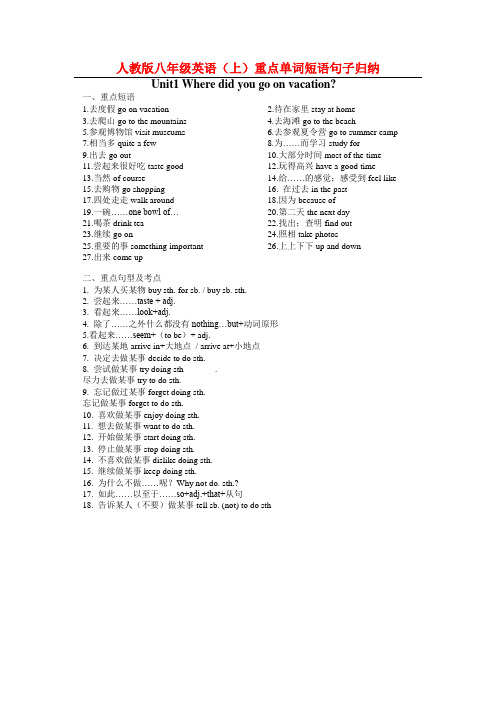
人教版八年级英语(上)重点单词短语句子归纳Unit1 Where did you go on vacation?一、重点短语1.去度假go on vacation2.待在家里stay at home3.去爬山go to the mountains4.去海滩go to the beach5.参观博物馆visit museums6.去参观夏令营go to summer camp7.相当多quite a few8.为……而学习study for9.出去go out 10.大部分时间most of the time 11.尝起来很好吃taste good 12.玩得高兴have a good time13.当然of course 14.给……的感觉;感受到feel like 15.去购物go shopping 16. 在过去in the past17.四处走走walk around 18.因为because of19.一碗……one bowl of… 20.第二天the next day21.喝茶drink tea 22.找出;查明find out23.继续go on 24.照相take photos25.重要的事something important 26.上上下下up and down27.出来come up二、重点句型及考点1. 为某人买某物buy sth. for sb. / buy sb. sth.2. 尝起来……taste + adj.3. 看起来……look+adj.4. 除了……之外什么都没有nothing…but+动词原形5.看起来……seem+(to be)+ adj.6. 到达某地arrive in+大地点/ arrive at+小地点7. 决定去做某事decide to do sth.8. 尝试做某事try doing sth .尽力去做某事try to do sth.9. 忘记做过某事forget doing sth.忘记做某事forget to do sth.10. 喜欢做某事enjoy doing sth.11. 想去做某事want to do sth.12. 开始做某事start doing sth.13. 停止做某事stop doing sth.14. 不喜欢做某事dislike doing sth.15. 继续做某事keep doing sth.16. 为什么不做……呢?Why not do. sth.?17. 如此……以至于……so+adj.+that+从句18. 告诉某人(不要)做某事tell sb. (not) to do sthUnit 2 How often do you exercise?一、根据汉语写短语。
【知识点】人教版八年级英语上册1~5单元重点单词,短语,句型全汇总,复习必备!.doc
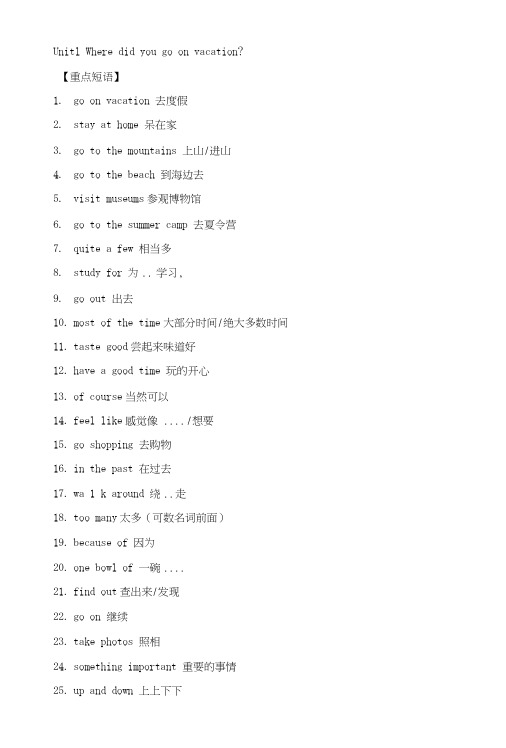
Unitl Where did you go on vacation?【重点短语】1.go on vacation 去度假2.stay at home 呆在家3.go to the mountains 上山/进山4.go to the beach 到海边去5.visit museums参观博物馆6.go to the summer camp 去夏令营7.quite a few 相当多8.study for 为.. 学习,9.go out 出去10.most of the time大部分时间/绝大多数时间11.taste good尝起来味道好12.have a good time 玩的开心13.of course当然可以14.feel like感觉像 .... /想要15.go shopping 去购物16.in the past 在过去17.wa 1 k around 绕.. 走18.too many太多(可数名词前面)19.because of 因为20.one bowl of 一碗....21.find out查出来/发现22.go on 继续23.take photos 照相24.something important 重要的事情25.up and down 上上下下e up 出来【重点句型】1.--- Where did you go on vacation? 你到哪里去度假了?--- 1 went to New York City. 我去了纽约城。
2.--- Did you go out with anyone? 你出去带人吗?--- No, No one was herc. Everyone was on vacation. 不,没有人在这儿。
大家度去度假了。
3.--- Did you buy anything special? 你买了什么特别的东西吗?--- Yes, I bought something for my father.对,我给父亲买了一些东西。
新人教版八年级英语(上)重点单词短语
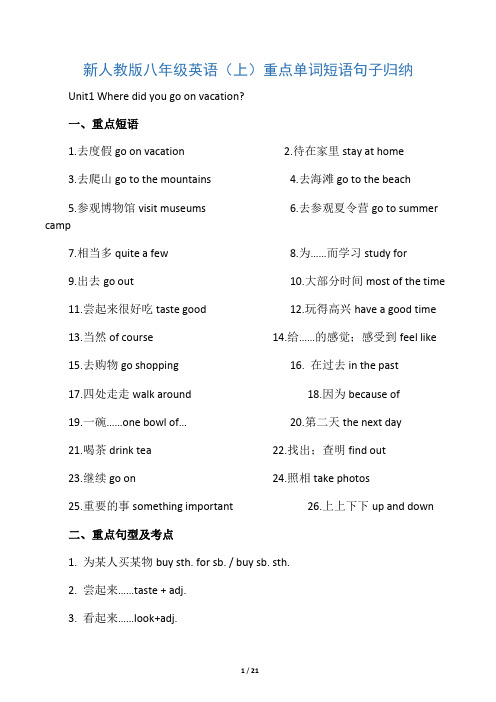
新人教版八年级英语(上)重点单词短语句子归纳Unit1 Where did you go on vacation?一、重点短语1.去度假go on vacation2.待在家里stay at home3.去爬山go to the mountains4.去海滩go to the beach5.参观博物馆visit museums6.去参观夏令营go to summer camp7.相当多quite a few 8.为……而学习study for9.出去go out 10.大部分时间most of the time11.尝起来很好吃taste good 12.玩得高兴have a good time13.当然of course 14.给……的感觉;感受到feel like15.去购物go shopping 16. 在过去in the past17.四处走走walk around 18.因为because of19.一碗……one bowl of… 20.第二天the next day21.喝茶drink tea 22.找出;查明find out23.继续go on 24.照相take photos25.重要的事something important 26.上上下下up and down二、重点句型及考点1. 为某人买某物buy sth. for sb. / buy sb. sth.2. 尝起来……taste + adj.3. 看起来……look+adj.4. 除了……之外什么都没有nothing…but+动词原形5.看起来……seem+(to be)+ adj.6. 到达某地arrive in+大地点/ arrive at+小地点7. 决定去做某事decide to do sth.8. 尝试做某事try doing sth .尽力去做某事try to do sth.9. 忘记做过某事forget doing sth.忘记做某事forget to do sth.10. 喜欢做某事enjoy doing sth.11. 想去做某事want to do sth.12. 开始做某事start doing sth.13. 停止做某事stop doing sth.14. 不喜欢做某事dislike doing sth.15. 继续做某事keep doing sth.16. 为什么不做……呢?Why not do. sth.?17. 如此……以至于……so+adj.+that+从句18. 告诉某人(不要)做某事tell sb. (not) to do sth Unit 2 How often do you exercise?一.根据汉语写单词。
初二英语上册知识点总结(人教版)

初二英语上册知识点总结(人教版)1. 语法知识点- 一般现在时:表示经常性或惯性的动作、状态或客观真理。
- 一般过去时:表示过去发生的动作或存在的状态。
- 现在进行时:表示现在正在进行的动作。
- 一般将来时:表示将来将要发生的动作或存在的状态。
- 定语从句:用来修饰名词或代词的从句。
- 状语从句:用来表示时间、地点、原因、条件或目的等的从句。
- 直接引语和间接引语的转换:将直接引语转化成间接引语需要考虑时态、人称、时间、地点等问题。
2. 词汇与短语- 常用动词短语:例如,look forward to, take part in, give up等。
- 时间短语:例如,in the morning, at night, on weekends等。
- 形容词与副词:例如,beautiful, quickly, slowly等。
- 连词与介词:例如,but, and, in, on等。
3. 句型结构- 主语 + 谓语:例如,Tom studies English.- 主语 + 不及物动词 + 状语:例如,He runs quickly.- 主语 + 系动词 + 表语:例如,She is beautiful.- 主语 + 及物动词 + 宾语:例如,I eat an apple.4. 阅读技巧- 理解词义:通过上下文判断单词的意思。
- 掌握关键信息:抓住文章中的重要信息。
- 推测逻辑关系:通过逻辑推理理解段落和篇章的结构。
- 注意细节问题:注意文章中的细节信息。
5. 听力技巧- 提前预测:在听对话或短文之前,先预测可能会涉及的内容。
- 注意语境:在听时将听到的语句与前后语境联系起来理解。
- 注意听力焦点:抓住关键词汇、数字和特别强调的内容。
以上是初二英语上册知识点的简单总结,希望对你有帮助!。
新人教新目标版八年级英语上册短语语法知识点汇总

人教版八年级英语上册短语语法知识点总结初二英语课组2019年[由我校初二英语科组根据最新考纲和近几年中考的趋势加上我校学生的实际情况,结合初二全体英语科组的力量,汇编了这一份重点总结,编好一份学案不易,望同学们能好好利用。
]Unit 1 Where did you go on vacation一、必背单词短语。
Section A1.Where did you go on vacation? (P. 1)on vacation意为“在度假”,结构“on+名词”表示“在某种状态中”。
例句:My family went to Hainan on vacation last year.2....visited my uncle (P. 1)visit此处用作及物动词,后接人或物做宾语,意为“拜访、看望”,后接表示地点的名词,意为“参观、游览”。
例句:I visited my grandmother last week.例句:Do you want to visit Shanghai?3....go with anyone? (P. 2)(1)anyone用作不定代词,意为“有人、任何人”,相当于anybody,用于疑问句和否定句中,在肯定句中用someone或者somebody。
但是anyone也可以用在肯定句中,表示“任何一个人”。
例句:Did you meet anyone friendly in that city?例句:Anyone can be helpful in some way.(2)anyone只能指人,不可以指物,后面不接of短语;any one既可以指人也可以指物,后可接of短语。
例句:You can ask any one of us about this question.4....buy anything special? (P. 2)(1)buy用作双宾语动词,表示“买”,常用的结构为“buy sb. sth.”或者“buy sth. for sb.”,表示“为某人买某物”。
人教版八年级上册英语重点句型归纳

人教版八年级上册英语重点句型归纳一、祈使句1. 肯定祈使句:动词直接用原形,如:Look at the blackboard.2. 否定祈使句:在动词前加Don’t, 如:Don’t talk in class.二、一般现在时1. 肯定句:主语+动词原形,如:She sings well.2. 否定句:主语+动词原形+not,如:They do not like playing football.三、一般过去时1. 肯定句:主语+动词过去式,如:She watched TV last night.2. 否定句:主语+助动词did+not+动词原形,如:I did not finish my homework yesterday.四、现在进行时1. 肯定句:主语+am/is/are+动词-ing,如:She is reading a book now.2. 否定句:主语+am/is/are+not+动词-ing,如:They are not playing games.五、一般将来时1. 肯定句:主语+will+动词原形,如:I will see you tomorrow.2. 否定句:主语+will+not+动词原形,如:He will not be late for school.六、情态动词1. can/can’t:表示能力/可能性,如:She can swim. She can’t speak Chinese.2. must/mustn’t:表示必要性/禁止性,如:You must finish your homework. You mustn’t play football in the classroom.七、There be 句型1. 肯定句:There is/are+名词,如:There is a book on the desk.2. 否定句:There is/are+not+名词,如:There are not any apples in the basket.八、疑问句1. 一般疑问句:助动词/情态动词+主语+动词原形,如:Can she swim?2. 特殊疑问句:疑问词+一般疑问句,如:Where is your father?以上是人教版八年级上册英语重点句型的归纳总结。
人教版八年级英语上册所有重点单词、短语和句型全汇总
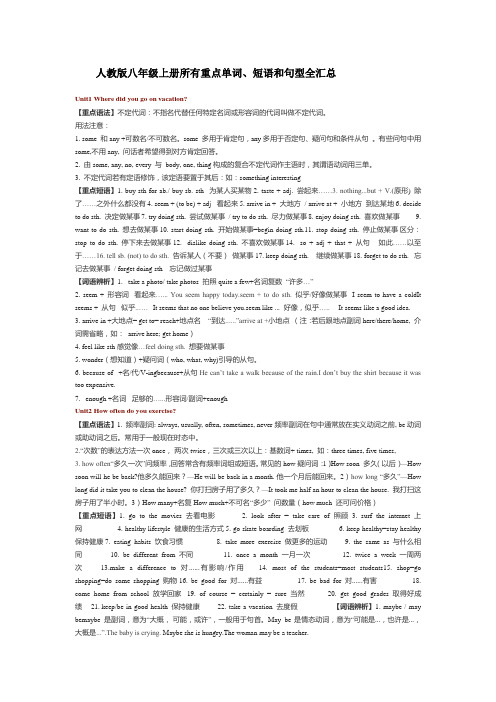
人教版八年级上册所有重点单词、短语和句型全汇总Unit1 Where did you go on vacation?【重点语法】不定代词:不指名代替任何特定名词或形容词的代词叫做不定代词。
用法注意:1. some 和any +可数名/不可数名。
some 多用于肯定句,any多用于否定句、疑问句和条件从句。
有些问句中用some,不用any, 问话者希望得到对方肯定回答。
2. 由some, any, no, every 与body, one, thing构成的复合不定代词作主语时,其谓语动词用三单。
3. 不定代词若有定语修饰,该定语要置于其后:如:something interesting【重点短语】1. buy sth for ab./ buy sb. sth 为某人买某物2. taste + adj. 尝起来……3. nothing...but + V.(原形) 除了……之外什么都没有4. seem + (to be) + adj 看起来5. arrive in + 大地方/ arrive at + 小地方到达某地6. decide to do sth. 决定做某事7. try doing sth. 尝试做某事/ try to do sth. 尽力做某事8. enjoy doing sth. 喜欢做某事 9. want to do sth. 想去做某事10. start doing sth. 开始做某事=begin doing sth.11. stop doing sth. 停止做某事区分:stop to do sth. 停下来去做某事12. dislike doing sth. 不喜欢做某事14. so + adj + that + 从句如此……以至于……16. tell sb. (not) to do sth. 告诉某人(不要)做某事17. keep doing sth. 继续做某事18. forget to do sth. 忘记去做某事/ forget doing sth 忘记做过某事【词语辨析】1. take a photo/ take photos 拍照quite a few+名词复数“许多…”2. seem + 形容词看起来…... You seem happy today.seem + to do sth. 似乎/好像做某事 I seem to have a coldIt seems + 从句似乎..…. It seems that no one believe you.seem like ... 好像,似乎….. It seems like a good idea.3. arrive in +大地点= get to= reach+地点名“到达......”arrive at +小地点(注:若后跟地点副词here/there/home, 介词需省略,如:arrive here; get home)4. feel like sth 感觉像…feel doing sth. 想要做某事5. wonder(想知道)+疑问词(who, what, why)引导的从句。
(完整word版)人教版八年级英语上册重点语法及句型归纳

1、不定代词A.形容词修饰不定代词时,要后知,做后置定语。
I’ll tell you something interesting.B. 不定代词做主语时,谓语动词用第三人称单数。
Everyone is here.2、一般过去时:在一般过去式的句子中,要注意不规则动词过去式的形式与拼写,要牢记一般过去时的时间状语。
I went to the cinema yesterday. / He hurt his foot last night.3、频度副词:在使用频度副词时,要注意频度副词在句子中的位置是:置于be 动词/情态动词/助动词之后,置于实意动词之前,而且对频度副词疑问要用how often。
He always sits in the front of the classroom. / I am never late for school.------How often do you watch TV?-----Every night.4、形容词、副词的比较等级A.Than 是比较级的标志词,than前的形容词或副词要用比较级。
He is taller than me.B.有比较范围(如:in 或of 短语)时,用最高级。
He is the tallest of the three boys.C.形容词最高级前必须加定冠词the.I’m the best student in my class.D.不规则变化的形容词、副词的比较等级要记牢。
He plays the piano worst.5、动词不定式A. 跟动词不定式作宾语的常用动词要记牢。
如:agree (同意);offer (提出);intend,plan (打算,计划);demand,ask (要求);promise (答应);help (帮忙);prepare (准备);decide (决定);refuse (拒绝);dare (敢于);choose (选择);wish,hope,want,expect ,would like (希望,想要);fail ;(不能;忘记);pretend (假装);manage (设法);determine (决心)。
新人教版八年级上册英语语法,短语和知识点总结

新人教版八年级上册英语语法,短语和知识点总结一、语法1、时态(1)一般现在时:表示经常性或习惯性的动作或存在的状态,常和表示频度的时间状语连用,如:always, usually, often, sometimes, seldom, never等。
(2)一般过去时:表示过去发生的动作或存在的状态,常和表示过去的时间状语连用,如:yesterday, last week, an hour ago, in 2004等。
(3)现在完成时:表示从过去某一时间一直持续到现在的动作或状态,常和表示过去的时间状语连用,如:since, for, already, yet等。
(4)过去完成时:表示过去某一时间之前已经发生或完成的动作,常和表示过去的时间状语连用,如:before, by the time, when, after等。
2、情态动词(1)can:能够、会(2)could:能够、会(过去式)(3)must:必须(4)have to:不得不、必须(5)should:应该、将要(6)would:将要(过去式)3、虚拟语气(1)一般现在时:主语+should/were to +动词原形+其他(2)一般过去时:主语+should/were to have +过去分词+其他二、短语1、make a difference:有影响,有区别2、at once:立即,马上3、take care of:照顾,照料4、in the end:最后,终于5、be good at:擅长于6、as well as:也,又7、keep healthy:保持健康8、come true:实现,成真三、知识点一般现在时:表示经常性或习惯性的动作或存在的状态,常和表示频度的时间状语连用,如:always, usually, often, sometimes, seldom, never等。
人教版八年级上册英语知识点总结

人教版八年级上册英语知识点总结一、语法重点1. 时态- 一般现在时:表示经常发生的动作或状态,以及普遍真理。
- 一般过去时:描述过去发生的动作或状态。
- 现在进行时:表示正在进行的动作。
- 过去进行时:描述过去某一时刻正在进行的动作。
2. 代词- 人称代词主格:I, you, he, she, it, we, they。
- 物主代词:my, your, his, her, its, our, their。
- 反身代词:myself, yourself, himself, herself, itself, ourselves, yourselves, themselves。
3. 介词- 表示时间的介词:at, on, in。
- 表示地点的介词:at, on, in。
- 其他常用介词:with, by, for, from, to, of。
4. 句型结构- 一般疑问句:使用助动词do/does构成。
- 特殊疑问句:使用疑问词who, what, where, when, why, how 等。
- 否定句:使用助动词do/does后跟not。
5. 词汇- 动词短语:take off, turn on/off, get up, go to bed等。
- 形容词和副词:big/large, small, quick/fast, slowly, carefully等。
- 常用名词:student, teacher, school, family, friend等。
二、词汇与短语1. 学校相关词汇- classroom, teacher, student, library, gym, cafeteria。
- subject, lesson, homework, project, test, exam。
2. 家庭与朋友- family, parent, brother, sister, friend, neighbor。
(完整版)人教版八年级上册英语知识点汇总
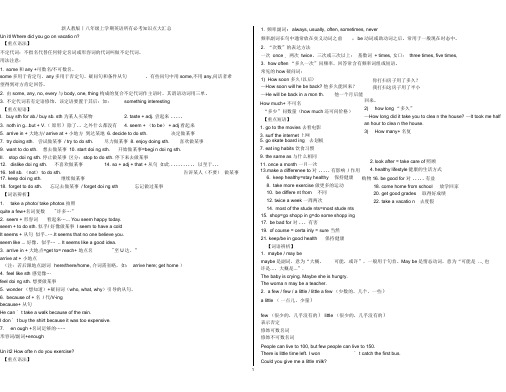
新人教版丨八年级上学期英语所有必考知识点大汇总Un itl Where did you go on vacatio n? 【重点语法】不定代词:不指名代替任何特定名词或形容词的代词叫做不定代词。
用法注意:1. some和any +可数名/不可数名。
some多用于肯定句,any多用于否定句、疑问句和条件从句。
有些问句中用some,不用any,问话者希望得到对方肯定回答。
2. 由some, any, no, every 与body, one, thing 构成的复合不定代词作主语时,其谓语动词用三单。
3. 不定代词若有定语修饰,该定语要置于其后:如:something interesting 【重点短语】I. buy sth for ab./ buy sb. sth 为某人买某物 2. taste + adj. 尝起来 .....3. noth in g...but + V.(原形)除了.. 之外什么都没有4. seem + (to be) + adj 看起来5. arrive in + 大地方/ arrive at + 小地方到达某地6. decide to do sth. 决定做某事7. try doing sth. 尝试做某事/ try to do sth. 尽力做某事8. enjoy doing sth. 喜欢做某事9. want to do sth. 想去做某事10. start doi ng sth. 开始做某事=begi n doi ng sth. II. stop doi ng sth. 停止做某事区分:stop to do sth. 停下来去做某事12. dislike doi ng sth. 不喜欢做某事14. so + adj + that + 从句如此.......... 以至于...16. tell sb. (not) to do sth. 告诉某人(不要)做某事17. keep doi ng sth. 继续做某事18. forget to do sth. 忘记去做某事/ forget doi ng sth 忘记做过某事【词语辨析】1. take a photo/ take photos 拍照quite a few+名词复数"许多…”2. seem + 形容词看起来…... You seem happy today. seem + to do sth. 似乎/ 好像做某事I seem to have a cold It seems + 从句似乎..….It seems that no one believe you. seem like ... 好像,似乎… .. It seems like a good idea.3. arrive in + 大地点=get to= reach+ 地点名"至U达. ”arrive at + 小地点(注:若后跟地点副词here/there/home, 介词需省略,如:arrive here; get home )4. feel like sth 感觉像…feel doi ng sth. 想要做某事5. wonder (想知道)+疑问词(who, what, why)引导的从句。
人教版八年级上册英语各单元重点短语句型【最新整理】
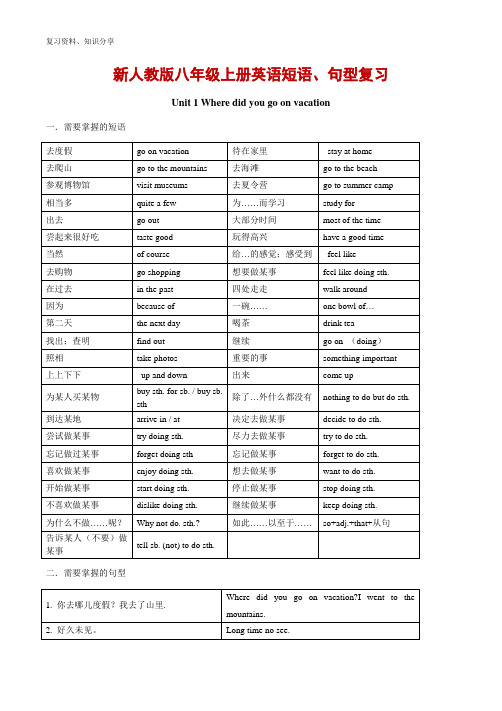
新人教版八年级上册英语短语、句型复习
Unit 1 Where did you go on vacation
一.需要掌握的短语
二.需要掌握的句型
Unit 2 How often do you exercise? 一.需要掌握的短语
.
二.需要掌握的句型
Unit 3 I’m more outgoing than my sister. 一.需要掌握的短语
二.需要掌握的句型
Unit 4 What’s the best movie theater?
一.需要掌握的短语
二.需要掌握的句型
Unit 5 Do you want to watch a game show? 一.需要掌握的短语
二.需要掌握的句型
Unit 6 I’m going to study computer science. 一.需要掌握的短语
二.需要掌握的句型
Unit 7 Will people have robots? 一.需要掌握的短语
二.需要掌握的句型
Unit 8 Will people have robots? 一.需要掌握的短语
二.需要掌握的句型
Unit 9 Can you come to my party? 一.需要掌握的短语
二.需要掌握的句型。
人教版八年级英语上册短语句型归纳

人教版八年级英语上册短语句型归纳- 1. 动词短语- be good at (擅长)- be interested in (对...感兴趣)- be famous for (因...而有名)- be tired of (对...厌烦)- be afraid of (害怕)- be proud of (为...感到骄傲)- be sure about (对...确信)- give up (放弃)- take part in (参加)- get along with (与...相处)- 2. 名词短语- a number of (许多)- a kind of (一种)- a lot of (许多)- a pair of (一双)- a piece of (一片/一块)- a set of (一套)- a group of (一群/一组)- a few (几个)- a little (一点)- a bit of (一些)- 3. 句型归纳- What's your hobby? (你的爱好是什么?)- How often do you...? (你多久...一次?)- Why do you like...? (你为什么喜欢...?)- Would you like...? (你想要...吗?)- Can I help you? (我能帮你吗?)- What do you think of...? (你对...有什么看法?)- What's your favorite subject? (你最喜欢的科目是什么?)- How do you find...? (你觉得...怎么样?)- I can't stand... (我受不了...)- It's up to you. (由你决定。
)以上是人教版八年级英语上册常用的短语和句型归纳,希望对你的学习有所帮助。
新人教版八年级上册英语单元语法及知识点归纳汇总

新人教版八年级上册英语单元语法及知识点归纳Unit1 Where did you go on vacation?【重点语法】不定代词:不指名代替任何特定名词或形容词的代词叫做不定代词。
用法注意:1. some 和any +可数名/不可数名。
some 多用于肯定句,any多用于否定句、疑问句和条件从句。
有些问句中用some,不用any, 问话者希望得到对方肯定回答。
2. 由some, any, no, every 与body, one, thing构成的复合不定代词作主语时,其谓语动词用三单。
3. 不定代词若有定语修饰,该定语要置于其后:如:something interesting【重点短语】1. buy sth for ab./ buy sb. sth 为某人买某物2. taste + adj. 尝起来……3. nothing...but + V.(原形) 除了……之外什么都没有4. seem + (to be) + adj 看起来5. arrive in + 大地方/ arrive at + 小地方到达某地6. decide to do sth. 决定做某事7. try doing sth. 尝试做某事/ try to do sth. 尽力做某事8. enjoy doing sth. 喜欢做某事9. want to do sth. 想去做某事10. start doing sth. 开始做某事=begin doing sth.11. stop doing sth. 停止做某事区分:stop to do sth. 停下来去做某事12. dislike doing sth. 不喜欢做某事14. so + adj + that + 从句如此……以至于……16. tell sb. (not) to do sth. 告诉某人(不要)做某事17. keep doing sth. 继续做某事18. forget to do sth. 忘记去做某事/ forget doing sth 忘记做过某事【词语辨析】1. take a photo/ take photos 拍照quite a few+名词复数“许多…”2. seem + 形容词看起来…... You seem happy today.seem + to do sth. 似乎/好像做某事I seem to have a coldIt seems + 从句似乎..…. It seems that no one believe you.seem like ... 好像,似乎….. It seems like a good idea.3. arrive in +大地点= get to= reach+地点名“到达......”arrive at +小地点(注:若后跟地点副词here/there/home, 介词需省略,如:arrive here; get home)4. feel like sth 感觉像…feel doing sth. 想要做某事5. wonder(想知道)+疑问词(who, what, why)引导的从句。
新人教版英语八年级上册重点词组和句型
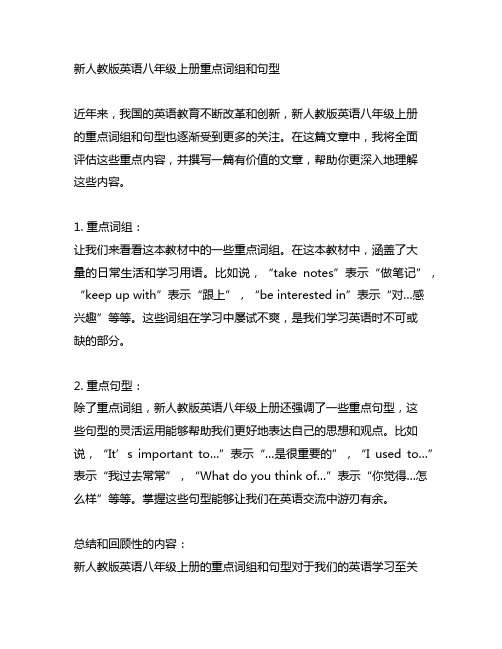
新人教版英语八年级上册重点词组和句型近年来,我国的英语教育不断改革和创新,新人教版英语八年级上册的重点词组和句型也逐渐受到更多的关注。
在这篇文章中,我将全面评估这些重点内容,并撰写一篇有价值的文章,帮助你更深入地理解这些内容。
1. 重点词组:让我们来看看这本教材中的一些重点词组。
在这本教材中,涵盖了大量的日常生活和学习用语。
比如说,“take notes”表示“做笔记”,“keep up with”表示“跟上”,“be interested in”表示“对…感兴趣”等等。
这些词组在学习中屡试不爽,是我们学习英语时不可或缺的部分。
2. 重点句型:除了重点词组,新人教版英语八年级上册还强调了一些重点句型,这些句型的灵活运用能够帮助我们更好地表达自己的思想和观点。
比如说,“It’s important to…”表示“…是很重要的”,“I used to…”表示“我过去常常”,“What do you think of…”表示“你觉得…怎么样”等等。
掌握这些句型能够让我们在英语交流中游刃有余。
总结和回顾性的内容:新人教版英语八年级上册的重点词组和句型对于我们的英语学习至关重要。
通过掌握这些词组和句型,我们能够更自如地表达自己的思想和观点,也能够更好地理解和运用英语。
在学习过程中,我们要多加练习,不断巩固和提升自己的语言能力。
个人观点和理解:就我个人而言,我认为新人教版英语八年级上册的重点词组和句型是我们学习英语时的基础,只有打好这个基础,我们才能更好地提升自己的英语水平。
在学习过程中,我们要多加练习,注重实践,积极参与各种课外活动,以提高我们的语言运用能力。
在本文中,我们深入评估了新人教版英语八年级上册的重点词组和句型,并撰写了一篇有价值的文章,帮助你更深入地理解这些内容。
希望这篇文章能够对你有所帮助,也希望你能够在学习英语的道路上取得更好的成绩。
新人教版英语八年级上册的重点词组和句型是我们学习英语时的基础,而且这些内容是我们在日常学习和生活中经常用到的。
- 1、下载文档前请自行甄别文档内容的完整性,平台不提供额外的编辑、内容补充、找答案等附加服务。
- 2、"仅部分预览"的文档,不可在线预览部分如存在完整性等问题,可反馈申请退款(可完整预览的文档不适用该条件!)。
- 3、如文档侵犯您的权益,请联系客服反馈,我们会尽快为您处理(人工客服工作时间:9:00-18:30)。
名师总结优秀知识点八年级上册复习要点Unit 1 Where did you go on vacation?重点短语:(1)go on vacation 去度假(3)stay at home 呆在家(5)go to the mountains 去爬山(7)go to the beach 去沙滩(9)visit museums 参观博物馆(11)go to summer camp 去夏令营(13)quite a few 相当多,不少(15)study for……为…而学习(17)go out 出去(19)most of the time 大多数时间(21)taste good 尝起来不错(23)have a good time 过得愉快(25)of course 当然(2)feel like 感受到(4)go shopping 去买东西(6)in the past 在过去(8)walk around….. 四处走走(10)too many 太多(12)because of+短语因为(14)one bowl of 一碗。
(16)find out 查明,弄清(18)take photos 照相(20)something important 重要的事情(22)up and down 上上下下(24)come up 上来(26)come down 下来重点语法:(1)Where did you go on vacation? I went to New York City.(2)Did you go out with anyone? No, No one was here. Everyone was on vacation.(3)Did you buy anything special? Yes, I bought something for my father. (4)How was the food? Everything tasted really good.(5)Did everyone have a good time? Oh,yes. Everything was excellent.习惯用法:(1)buy sth for sb./ buy sb. sth 为某人买某物(2)taste + adj. 尝起来……(3)nothing ….but + V.(原形)除了…之外什么都没有(4)seem + (to be) + adj 看起来(5). arrive in + 大地方arrive at + 小地方到达某地(6) decide to do sth. 决定做某事(7). try doing sth. 尝试做某事(8)try to do sth. 尽力做某事(9)try one`s best to do sth尽力做某事(10)enjoy doing sth. 喜欢做某事(11)want to do sth. 想去做某事(12)start doing sth. 开始做某事(13)stop doing sth. 停止做某事stop doing sth 停下来做某事(14)look + adj 看起来(15)dislike doing sth. 不喜欢做某事(16)Why not do sth. 为什么不做…….呢?(17)so + adj + that + 从句如此…以至于(18)tell sb. (not) to do sth.告诉某人(不要)做某事(19) keep doing sth. 继续做某事(20).forget to do sth. 忘记去做某事forget doing sth 忘记做过某事词语辨析:○1anywhere 与 somewhere 两者都是不定副词。
anywhere 在任何地方,常用于否定句和疑问句中。
I can’t find it anywhere. somewhere 在某处,到某处,常用于肯定句。
I lost my key somewhere near here. ○2 seem + 形容词看起来….. You seem happy today.seem + to do sth. 似乎、好像做某事 I seem to have a coldI seems / seemed + 从句看起来好像…;似乎…. It seems that no one believe you.seem like ….好像,似乎….. It seems like a god idea.○3decide to do sth.决定做某事 They decide to visit the museum.decide + 疑问词 + 动词不定式 He can not decide when to leave.○4 start doing sth = start to do sth. 开始,可与begin 互换。
He started doing his homework.○5over 介词,多于,超过,在…以上(表示数目、程度)= more thanMy father is over 40 years old.○6. too many 太多,后接可数名词复数: Mother bought too many eggs yesterday. too much 太多,修饰不可数名词,修饰动词作状语。
We have too much work to do. Don’t talk too much.○7 because of 因为,由于,后接名词、代词或动名词,不能接句子。
He can’t take a walk because of the rain.because 连词,因为,引导状语从句,表示直接明确的原因或理由。
I don’t buy the shirt because it was too expensive.○8too,…to 太….以至于不能…. Mother is too tired to go to school.○9have fun doing sth 享受做某事的乐趣Unit 2 How often do you exercise?短语:(1)help sb with sth 帮助某人做某事(2)go shopping 去买东西(3)on weekends 在周末(4)how often 多少次(5)hardly ever 几乎从不(6)once a week 一星期一次(7)twice a month 一个月两次(8)go to the movies 去看电影(9)every day 每天(10)use the Internet 上网(11)be free=be not busy=have time 有空(12)have dance and piano lessons 上舞蹈和钢琴课(13)swing dance 摇摆舞(14)play tennis 打乒乓球(15)stay up late 熬夜到很晚(16)go to sleep 睡觉(17)go to bed 上床睡觉(18)at least 至少,不少于,起码(19)go to bed early 上床睡觉早(20)play sports 做运动(21)be good for 对….有好处(22)be good at doing sth 擅长做某事(23)go camping 去野营(24)in one’s free time 在某人的业余时间里(25)the most popular 最受欢迎的(26)such as 例如….像….这样(27)go to the dentist 看牙科医生(28)more than 多于(29)old habits lie hard 旧习难改(30)less than 少于(31)junk food 垃圾食品(32)take care of sb 照料某人(33)look after sb 照顾某人(34)have to do sth 必须做某事(35)get in…进入…(36)be late for 迟到语法要点:(1)What do you usually do on weekends? I always exercise.(2)What do they do on weekends? They often help my mother with housework. (3)What does she do on weekends? She sometimes goes shopping.(4)How often do you go to the movies? I go to the movies maybe once a month. (5)How often does he watch TV? He hardly ever watches TV.(6)Do you go shopping? No, I never go shopping.习惯用法:1. help sb. with sth=have sb do sth 帮助某人做某事2. How about doing…? ….怎么样?/ ….好不好?3. want sb. to do sth. 想让某人做某事4. How many + 可数名词复数+ 一般疑问句….有多少…..5. 主语+ find+ that 从句…发现…6. It’s + adj.+ to do sth. 做某事是….的7. spend time with sb. 和某人一起度过时光8. ask sb. about sth. 向某人询问某事9. by doing sth. 通过做某事10. What’s your favorite…..? 你最喜欢的……是什么?11 start doing sth. 开始做某事12. the best way to do sth. 做某事的最好方式13.full of 满的14.what about doing sth ?做某事怎么样?15.not….at all 一点儿也不 I don`t like it at all. 我一点儿也不喜欢它。
词语辨析:1.free 空闲的,有空的,反义词为 busy. be free 有空,闲着,相当于 have time.I’ll be free next week. = I’ll have time next week.2.How come?怎么会?怎么回事?表示某件事情很奇怪,有点想不通;可单独使用,也可引导一个问句,相当于疑问句 why, 但 how come 开头的特殊疑问句使用的仍然是陈述语序。
